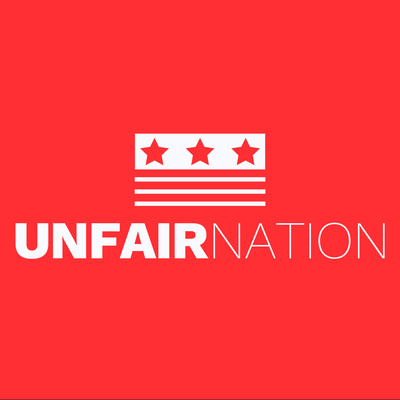
UnfairNation
By Ehsan Zaffar
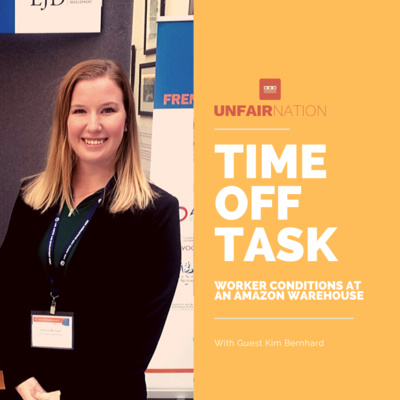
UnfairNationNov 28, 2019

Watch the Watchers
Does documenting the police help make them better?
We are a violent country by almost all measures, including the number of citizens in the United States who are assaulted or die at the hands of police.
In this episode, I’m talking to someone who is looking to end police brutality by shedding light on how the Los Angeles Police Department responds to calls. My guest William Gude has been running “Film the Police LA” for the last several years, a project that is part of a growing movement of “cop watchers” who leverage technology to document and then share how police respond to incidents, believing that doing so will change the way policing functions on a day to day, street to street level.
Let’s listen to what William has to share about his work, why he feels its important and how others can get involved safely and responsibly in this work.

UnfairNation LIVE: Why More Women Should Run for Office
This episode continues our conversation about why running for public office is important, but it is a little different - it’s a recording of a live conversation I had with Amy McGrath, who ran for both the U.S. House of Representatives and then for the Senate against Mitch McConnell. This episode also contains an introduction from former Los Angeles Mayor Antonio Villaraigosa.
As you’ll learn, Amy is a trailblazer. She was the first woman to fly a combat mission for the Marine Corps and the first to pilot the F-18 fighter jet on a combat mission. In our conversation, Amy and I touch on a variety of issues - but most importantly, the role of women as political leaders and why more women need to be in positions of power. Amy also shares the challenges and advantages of serving in the armed forces and then running for high political office during the pandemic.
UnfairNation is recorded at The Difference Engine, a venture studio housed Arizona State University that builds products communities can use to reduce inequality. This conversation was part of a regular speaker series The Engine holds called Engineering Change. You can check more about our work by visiting thedifferencenegine.asu.edu.
Enjoy!
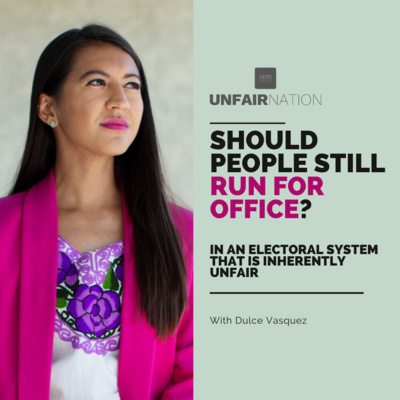
Should People Still Run for Office?
It’s been a while since I recorded an episode, so apologies for that, but I think you’re going to like the changes we’ve made over the last few months. First, I’m making episodes a little shorter - just the right length to listen to on a three mile run, and because this podcast is a great cure for insomnia, you can also use it to knock out at night.
Second, we’re now recording UnfairNation at Arizona State University’s beautiful and historic Herald Examiner Building in downtown Los Angeles. As some of you may know, I run The Difference Engine at Arizona State University, where we build products communities can use to reduce inequality.
I’ll be sharing more information about our work later in the year, and also introducing you to the students who will help research the content for this podcast as well as edit and produce it. In the meantime, I want to give a shoutout to Aubrey Hicks, The Engine’s Chief of Staff, who helped produce and organize this episode.
So! On to Dulce! I met Dulce when I first started at ASU. She’s got more energy than almost anyone I know and she was one of the first supporters (and currently serves as the first fellow) at the Difference Engine. Last year, she announced her candidacy for Los Angeles City Council District 9 and by all accounts ran a stellar grassroots campaign to unseat an incumbent politician. Despite her tremendous efforts and those of her team, she failed to unseat him.
In her quest for political office are important lessons for those thinking of running. The electoral system in this currently has been inherently unfair since this country’s founding, and because the system is so tilted, many people today think that running for office is one of the last ways to influence positive public policy change.
But, as you’ll hear, despite acknowledging and agreeing with the cynics, despite her own loss, Dulce remains steadfastly positive about the electoral system.
So let’s listen to Dulce and her views on why local politics are still inequitable, what we can all do to make things less unfair and why she still thinks people (especially women) should run for office.
Dulce talked about:
- Learn more about Democracy Vouchers
- Learn more about Emerge America
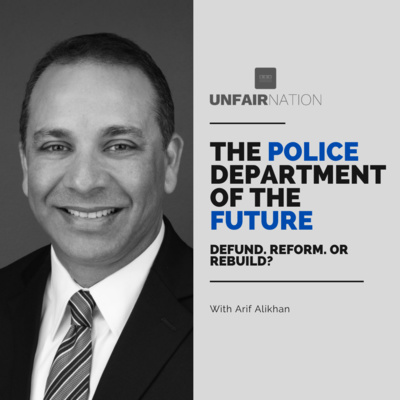
The Police Department of the Future
To proponents of defunding the police Arif AliKhan says that police departments as functional units still have a unique role to play in our society. To those who defend the police at all costs he says that the police need to be reformed, perhaps significantly.
This is a balanced and pragmatic approach that may find limited traction in our current times. But it comes from a place of deep experience as the Director of the Office of Constitutional Policing at the LAPD, and prior to that roles as Assistant Secretary for Policy at the Department of Homeland Security and as Deputy Mayor of Los Angeles.
In this episode we talk about body-worn cameras and how they are amazing, but severly limited tools for encouraging good law enforcement behavior and also what Arif thinks the future of policing looks like ... he literally paints a picture of it, step by step. Its a view we don't often hear and I think his insider's perspective is a valuable listen.
Oh and yeah ... we're back. So look for additional episodes we've recorded over the last few months hitting your favorite podcast app soon. Thanks, as always, for listening.
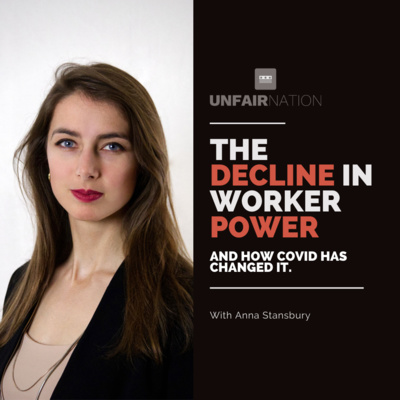
Worker Power and How COVID Has Changed It
We're back from a bit of a break and informally starting a new season!
The decline of worker power over the last four decades has been fundamental and transformational according to my guest Anna Stansbury, a Ph.D. candidate at Harvard University. She argues that the long-term decline in worker power may have been caused by a number of related trends, including a decline in labor unions and ruthless cost-cutting and management by corporations.
Anna's hypothesis is laid out in a fascinating paper which she co-authored with Larry Summers entitled The Declining Worker Power Hypothesis. On this episode, Anna talks with me about her findings as well as other broader macroeconomic trends effecting workers during the pandemic, including how increasing the minimum wage may have unintended consequences for lower-income communities and why even wealthier wage earners are affected by deepening economic inequality.
If you haven't already sign up for the UnfairNation newsletter! (link: https://unfairnation.ghost.io/)
- Link to Anna and Larry Summers' paper: (link: https://scholar.harvard.edu/files/stansbury/files/2020.6.30_stansbury_summers_the_declining_worker_power_hypothesis.pdf)
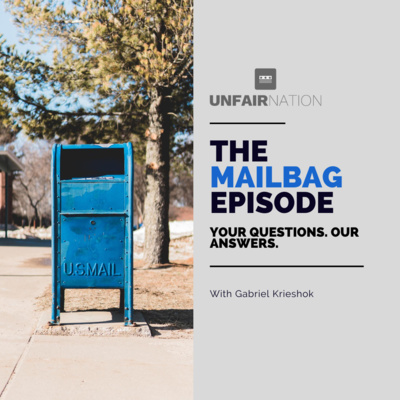
The Mailbag Episode
Hey! We're trying something different here while we take a bit of a break: answering your questions! If this resonates with you, we'd love to answer more of your questions. You can ask them on Twitter, Facebook or Instagram by tagging your post with #UnfairNation OR you can sign up for Ehsan's newsletter by going to UnfairNation.com and just reply to any newsletter with your questions!
Some topics we cover:
- Why "UnfairNation"?
- Why are people protesting NOW.
- What's the difference between equality, equity and fairness?
- Why police unions are one of the primary barriers to police reform.
Hope you enjoy this episode. Can't wait to show you what we have in store later this summer!

Why Are Prescription Drugs So Expensive?
We are all waiting for that one, miracle vaccine to be developed so that we can go back to work and so that no more lives have to be lost to COVID. But our guest today explains why the pharmaceutical industry has deeper, older and broader problems - which will affect who ends up getting a COVID vaccine when it comes out and how expensive it will be.
Her name is Merith Basey and she's a public health expert and advocate and also the Executive Director of Universities Allied for Essential Medicines, which encourages institutions of higher education to make publicly-funded medicine more affordable.
Shes got some crazy facts about the pharmaceutical industry that will blow your minds, and a hopeful vision for how we can fix the industry through direct involvement by the public (that means you!).
Links
- Universities Allied for Essential Medicines (LINK: https://uaem.org)
- The Open Covid Pledge (LINK: https://opencovidpledge.org/)

What You Can Do ... To End Health Inequity, Racism and Police Brutality
I hope you all are doing well and staying safe. Maybe, if you find it within yourself to do so, you are protesting police brutality, or amplifying the voices of those who are. I hope you are doing something, because a revolution in policing needs to happen, and our nation needs to be on the right side of it.
My guest today is going to talk to us today about these protests, as well as health inequities in rural South Carolina, among other topics. He's the Democratic front-runner for the Senate seat in South Carolina, aiming to unseat Lindsay Graham and according to many recent polls, he may just win his seat come November.
This is a great interview and I think it will speak to many of us who are looking for ways to get involved or help the Black community in America.
This issue is particularly important to me as a civil rights lawyer, as someone who has worked in law enforcement, as a person of color ... and most importantly as an ally to my Black brothers and sisters.
I have worked to reform, educate and oversee law enforcement at many levels in this country for over a decade now and these protests are a long time coming, because obviously the work I and many others have done, is not enough.
If you haven't already, I invite you to go to UnfairNation.com and subscribe to our newsletter where I share what I think a possible solution to this crisis may be as well as how you can think about ways to help. And if you're a new listener, I hope you will subscribe to our podcast and rate us on your favorite podcast app. Thanks, as always, for listening.
Show notes:
- Jaime's campaign website: https://jaimeharrison.com
- Jaime's book (great for those interested in a career in politics): Climbing the Hill (Link: https://www.amazon.com/Climbing-Hill-Career-Politics-Difference/dp/0399581936/ref=sr_1_1?dchild=1&keywords=jaime+harrison&qid=1591140360&sr=8-1)
#blacklivesmatter #blackouttuesday
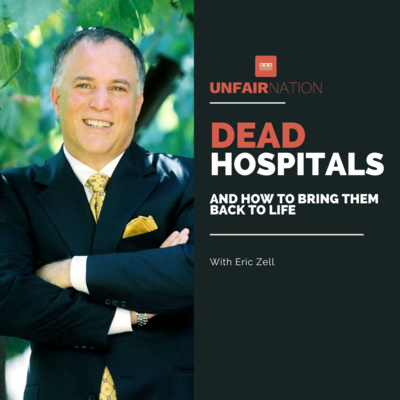
Dead Hospitals. And How to Bring Them Back to Life.
Today's episode is a story about a hospital across the bay from one of the wealthiest neighborhoods on the planet and why, despite all that money, it couldn't afford to stay open. The heroic effort to keep this hospital open has chilling lessons for all of us, especially today as Americans become increasingly sick and die from COVID.
The story comes to us from my guest Eric Zell. Eric is a consultant, former political staffer and most recently an elected member of the West Contra Costa Healthcare District Board of Directors where he oversaw and then tried to save Brookside Hospital (also known as Doctors Medical Center). Brookside was started by Eric's father and served those in the East Bay Area who could not go elsewhere for medical care. But though the story of the closure of Doctor's Medical Center is an important one, as you listen, I'd like you to also think about your community.
Show Notes:
- Article: What happened after Doctor's Medical Center closed (Link: https://www.sfchronicle.com/business/article/A-year-after-hospital-closed-250-000-in-Contra-7278435.php)
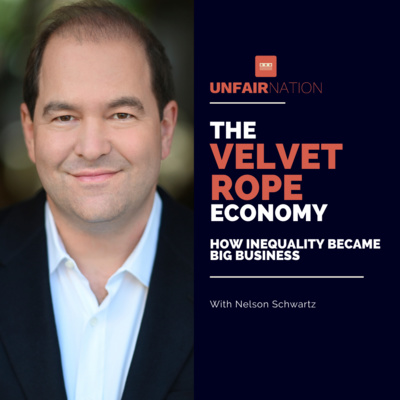
The Velvet Rope Economy: How Inequality Became Big Business
We‘ve always been able to buy a first-class upgrade on a flight, but what happens when you can buy medical care, admissions to elite universities and high-school sports championships? This episode’s guest talks about the rise of this “Velvet Rope Economy” and what it means for the 99% (those of us making less than several million a year).
His name is Nelson Schwartz and he’s an award-winning economics reporter at the New York Times and author of the recent book, The Velvet Rope Economy.
Links:
- Nelson’s book: The Velvet Rope Economy (Link: https://amzn.to/35UOw8L)

Virus of Hate: Why The Coronavirus Has Become a Battle Cry for Extremists
Militant groups, domestic terrorists and white supremacists (they play in the same little league division) are all finding that the rise in discrimination and hate crimes against Asian-Americans during the COVID-19 pandemic is helping their cause. In fact, they are capitalizing on the hatred. Some are going beyond Asians and blaming their old "go-to" groups such as Jews and Muslims for the virus. This is both a domestic and global phenomenon.
Dr. Erroll Southers is this week's guest. He discusses how the rise in Coronavirus-related incidents ties in with the larger threat posed by homegrown violent extremists (HVE's). Importantly, he shares ways to safely help when you see someone being harassed. Dr. Southers is a professor at USC's Sol Price School of Public Policy and Executive Director of the Safe Communities Institute where he studies violent extremism.
Big thank you to Nicole Anselmo for her help with this and other recent UnfairNation episodes!
If you like what you hear, rate us on iTunes and subscribe! Thanks for listening and stay safe.
Links
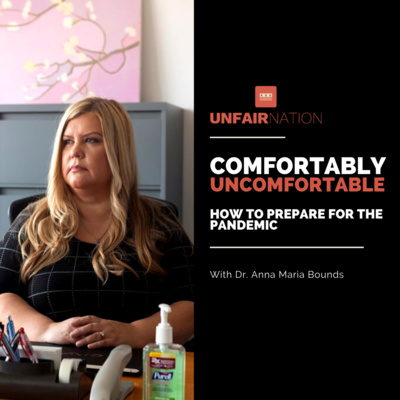
Comfortably Uncomfortable: How to Prepare for the Pandemic
When you hear the word "prepper" what do you think of? Is it someone living in the rural south, a proponent of more gun rights, and distrusting of the federal government? My guest Dr. Anna Maria Bounds wants to disabuse of you that notion. After spending years with the disaster prepper community she learned that they are nothing like that stereotype.
In this episode of UnfairNation, Dr. Bounds discusses what prepper communities really look like, how to prep, and how state and local governments can integrate lessons from the prepper community to better serve low-income communities affected by disaster.
A big thank you to my co-producer Nicole Anselmo for her help and guidance on this and many other episodes of UnfairNation
Stay safe and indoors.
--
- Check out Anna Maria's upcoming book, Bracing for the Apocalypse (https://amzn.to/2Vsif5h)
- A New York Times article where Anna discusses how we can prepare for the Coronavirus or other future disasters: (https://www.nytimes.com/2020/03/17/us/coronavirus-preppers.html)
- A helpful tool to calculate how much food you'd need during a crisis like a pandemic: Food Calculator: (https://graphics.reuters.com/HEALTH-CORONAVIRUS/FOOD/ygdpzjrwpwa/index.html?utm_source=twitter&utm_medium=Social)
- And finally here's a link to the New York Preppers Network that Anna mentions during the podcast: (https://www.meetup.com/NYC-Preppers-Network/)
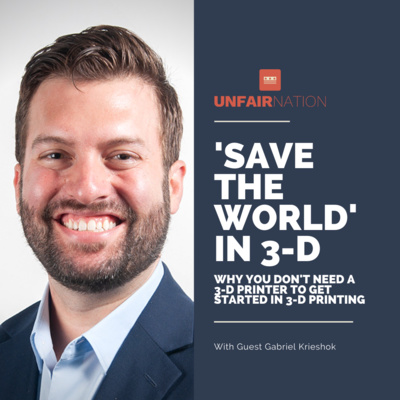
'Save the World' in 3-D: Why You Don't Need a 3-D Printer to Get Started in 3-D Printing
Everyone's heard of 3-D printing, but not everyone has printed something ... in 3-D themselves. My guest Gabriel Krieshok thinks that they can, even without owning a 3-D printer. In another "remote episode" (since we have no other choice BUT to be remote) we talk with him about what 3-D printing is and how anyone can get started printing their own models and objects. We also discuss how communities around the country are using 3-D printers to help fight the Coronavirus pandemic by printing ventilator parts and personal protective equipment, such as visors. Lastly, we talk about how students, educators and especially communities can use 3-D printing in lieu of expensive wood, metal or drafting workshops to achieve similar results.
Gabriel Krieshok is a Data Scientist and the Global Lead for Digital Transformations at Abt Associates. Gabriel has 15 years of experience in global technology initiatives, where his focus has been on building digital products that are well-designed for use. He's worked with the U.S. State Department, USAID, the Peace Corps, the World Bank, New America, and has advised consulted on a number of projects related to global technology. Gabriel is the founder of ProprThings, a 3d-printing design studio of "useful objects inspired by design solutions to everyday life." He holds a Master's of Science in Information and a Master's of Public Policy—both from the University of Michigan. In his spare time, Gabriel is working on a book of EveryDay Concepts, that he sketches on index cards.
Links to some of the resources Gabriel discusses on the show:
https://www.thingiverse.com - Digital Designs for Physical Objects
https://craftcloud3d.com - 3-D Printing Service Partner
https://www.tinkercad.com - Create 3-D Designs With Online CAD
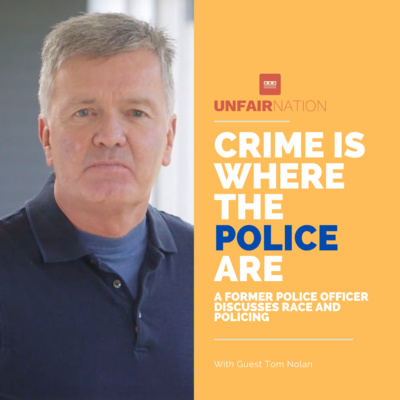
"Crime is Where the Police Are"
The Coronavirus has come and like you, we are also at home socially distancing ourselves from the rest of humanity. That's why this is our first "remote" podcast with former police officer and current professor, Tom Nolan. We've had to make do with a somewhat patchy online connection but all of Tom's excellent thoughts on race, policing and crime in low-income neighborhoods still come through clear as day.
Tom Nolan is a maverick, a community leader and an agent of change who fights to make policing more equitable and accessible. Check out this commercial he was in for expanding access to medicinal marijuana.
As always, a big thank you to TechChange for sponsoring our podcast. Check out their course catalog!
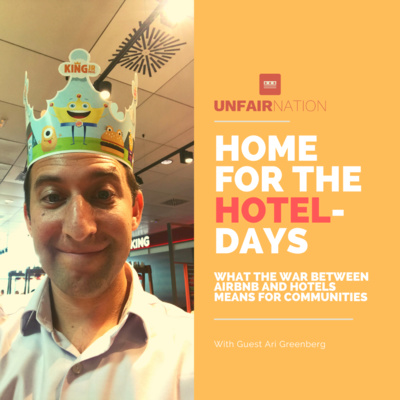
Home for the HotelDays: What The War Between AirBnB and Hotels Means for Communities
The holidays are over, as are most hotel stays. But even though January is a slow month for hotels, our podcast keeps chugging along! We've brought Ari Greenberg into the studio this episode to talk about hotels, home-sharing services like AirBnB and the brewing conflict between them. We also discuss how people have chosen to respond to growing AirBnB rentals in their neighborhoods and what, if any, meaningful government regulations can be implemented encourage responsible growth.
Ari is President and Founder of BCV - a company that works with hotels to encourage meaningful dialogue with their customers, employees and communities.
As always, a big thank you to TechChange for sponsoring our podcast. Check out their course catalog!
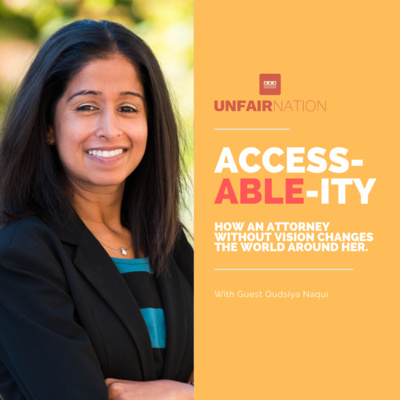
Access-ABLE-ity: How an attorney without vision changes the world around her.
A big thank you to TechChange for their generous support - we record these episodes in their studios, using their equipment and with help from their staff. Check out how they have leveraged tech for social good for the past decade.
Happy holidays and a happy new year!
Links
Washington Post article about how Qudsiya explores the city on her bike (a phenomenal read)
UNO Braille Cards

Time Off Task: Worker Conditions at an Amazon Warehouse
Two-day delivery is not "free". All that #BlackFriday convenience is coming at the expense of worker safety. Two stunning stories this week revealed that not only are Amazon warehouses dangerous places to work, but that Amazon dodged workplace safety regulations for years.
In this inaugural episode of UnfairNation I interview Kimberly Bernhard, a brilliant student I worked with at the International Law Institute who spent some time at an Amazon warehouse in Illinois over the last year. From the "curtain of light" to "Time Off Task" - she shares some disturbing and somewhat dystopian workplace practices at Amazon's warehouses in Illinois.
UnfairNation is a collaboration between Ehsan Zaffar and sponsor TechChange. TechChange is a US social enterprise which provides courses on the use of technology in addressing social and global challenges. Check out their latest work here.
Photo by Ruchindra Gunasekara on Unsplash